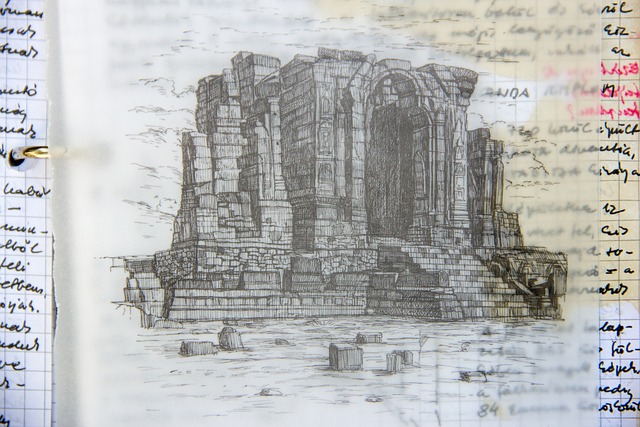TL;DR:
UK Literary Criticism Translation Services are vital for preserving authors' intent, ensuring complex ideas and cultural references are accurately conveyed in academic discussions. They balance fidelity to the source with fluency, maintaining the aesthetic and emotional impact of literary works. Select reliable services with experienced literary translators skilled in handling nuance, cultural context, and detail. Quality assurance processes guarantee accuracy, while ethical practices respect intellectual property rights. These services democratize access to diverse literary works, fostering global academic collaboration and enriching critical discourse. The future includes advanced tech alongside human expertise for specialized, culturally sensitive translations.
In the realm of UK literary criticism, reliable translation services are indispensable tools for navigating diverse linguistic landscapes. This article delves into the critical role of accurate translations, exploring challenges from cultural nuances to the choice between human translators and machine tools. We guide scholars through selecting reputable UK services, ensuring quality assurance, and considering ethical aspects. By examining case studies and future trends, this piece illuminates the importance of accessible and cost-effective translation for enhancing literary analysis globally.
- Understanding the Importance of Accurate Translation in Literary Criticism
- The Challenges of Translating Literary Works for Critical Analysis
- Selecting Reliable UK Translation Services for Academic Criticism
- Ensuring Cultural Nuance and Contextual Sensitivity in Translations
- The Role of Human Translators vs Machine Translation Tools
- Quality Assurance Processes in Professional Translation Services
- Case Studies: Successful Translations in the Field of Literary Criticism
- Ethical Considerations in Literary Translation: Rights and Ownership
- Accessibility and Cost-Effectiveness of Translation Services for Scholars
- Future Trends in UK Literary Criticism Translation Services
Understanding the Importance of Accurate Translation in Literary Criticism

In the realm of UK literary criticism, where nuances and subtle meanings are paramount, accurate translation services play a pivotal role. When engaging with texts from diverse linguistic backgrounds, relying on professional translators is essential to preserve the author’s intent and artistic integrity. This is particularly true for academic discussions, literary analyses, and research papers, where precise language can make or break the interpretation.
Accurate UK Literary Criticism Translation Services ensure that complex ideas, rich metaphors, and cultural references are conveyed faithfully from one language to another. They help navigate the challenges posed by idiomatic expressions, poetic devices, and semantic differences, allowing critics to delve deeper into the text and offer insightful interpretations. By partnering with experienced translators, scholars can access a broader range of literature, fostering a more inclusive and comprehensive discourse within the field of literary criticism.
The Challenges of Translating Literary Works for Critical Analysis

Translating literary works for critical analysis presents unique challenges that go beyond simple word-for-word rendering. When it comes to UK literary criticism translation services, precision and cultural nuance are paramount. Literary texts often contain idiomatic expressions, metaphorical language, and subtle references that can be difficult to convey accurately in another language. A skilled translator must understand not only the syntax and semantics of both languages but also their cultural contexts to ensure the critical analysis remains valid and meaningful.
Moreover, maintaining the original work’s aesthetic and emotional impact is essential for a successful translation. Literary critics rely on the text’s original form to support their interpretations. Therefore, UK literary criticism translation services must strike a delicate balance between fidelity to the source text and fluency in the target language, ensuring that the translated work not only communicates the same critical ideas but also resonates with readers in its new cultural setting.
Selecting Reliable UK Translation Services for Academic Criticism

Selecting reliable translation services is paramount when engaging in academic criticism, especially when working with UK literary texts. The nuances and subtleties within literary works demand precision and cultural sensitivity from translators to ensure the integrity of the original text’s intent. This is even more crucial for UK Literary Criticism Translation Services, where the interpretation must capture the depth of philosophical or artistic expression inherent in these writings.
When choosing a translation service, look for providers with a proven track record in literary translation, specifically within academic circles. Expertise in handling complex literary texts and a deep understanding of cultural contexts are essential. Reputable services will employ professional translators who not only possess linguistic proficiency but also have a keen eye for detail and an appreciation for the artistic value of literature. This ensures that the translated work is not merely a word-for-word rendition but a faithful representation of the original UK literary criticism, allowing readers to engage with the text authentically.
Ensuring Cultural Nuance and Contextual Sensitivity in Translations

When it comes to UK literary criticism translation services, capturing the cultural nuance and contextual sensitivity of the original text is paramount. Literary works often employ idioms, metaphors, and references that are deeply rooted in a specific culture or language. Skilled translators must go beyond word-for-word translations to grasp these subtleties and convey them accurately in the target language. This involves extensive knowledge of both cultures, allowing for a seamless transition that retains the essence of the original criticism.
Contextual sensitivity is equally crucial. A translation must resonate with readers in the target market while adhering to the author’s intended message. UK literary critics expect translations to reflect the nuances of their language and cultural norms, ensuring that the translated work not only makes sense but also inspires the same emotional response as the original. This level of precision requires a deep understanding of both the source and target languages, making it essential for translators to stay updated with contemporary literary trends and critical discourse in the UK.
The Role of Human Translators vs Machine Translation Tools

When it comes to translating literary criticism, the choice between human translators and machine translation tools is crucial for maintaining the integrity of the original text. While machine translation has advanced significantly in recent years, it still struggles with nuanced language, idiomatic expressions, and cultural references specific to UK literary criticism. Human translators, on the other hand, bring a depth of understanding not only to the language but also to the context and subtleties inherent in academic discourse.
UK Literary Criticism Translation Services employ native speakers with expertise in literary theories and historical contexts, ensuring that translations are not just word-for-word but accurately convey the author’s intent. Human translators can adapt complex ideas into clear, concise language while preserving the original text’s essence. This level of precision is particularly important when dealing with subtle arguments or critical analyses that demand a high level of intellectual clarity.
Quality Assurance Processes in Professional Translation Services

Professional translation services for UK literary criticism must adhere to stringent quality assurance processes to maintain accuracy and fluency. These processes involve multiple stages, from initial evaluation and source text analysis to translation, review, and final delivery. Each step is crucial in ensuring that the translated work not only conveys the intended meaning but also respects the nuances and subtleties of the original literary criticism.
UK Literary Criticism Translation Services employ expert linguists who possess a deep understanding of both the source and target languages, as well as cultural context. They employ specialized terminology databases and style guides to maintain consistency in technical terms and idiomatic expressions. Peer review and client feedback loops further refine the translation, guaranteeing that it meets the highest standards of quality and academic rigor expected in literary criticism.
Case Studies: Successful Translations in the Field of Literary Criticism

In the realm of UK literary criticism, the precision and nuance of translation play a pivotal role in conveying complex ideas and artistic intricacies from one language to another. Case studies abound where meticulous UK Literary Criticism Translation Services have transformed critical essays, literary analyses, and theoretical frameworks, enabling scholars and critics worldwide to engage with influential works that might otherwise remain inaccessible.
These translations not only ensure the academic integrity of the original text but also enrich the global discourse on literature by fostering cross-cultural understanding. For instance, a well-executed translation can capture the subtle play of words, cultural references, and metaphorical depth inherent in literary texts, making it possible for critics from diverse linguistic backgrounds to contribute their unique perspectives to the critical conversation. This exchange not only broadens the scope of literary study but also strengthens the bonds between intellectual communities worldwide.
Ethical Considerations in Literary Translation: Rights and Ownership

In the realm of UK literary criticism translation services, ethical considerations are paramount. When translating critical texts, it’s crucial to respect the intellectual property rights of both the original author and the translator. Literary works often carry cultural significance and nuanced meanings that require a delicate balance between accuracy and artistic interpretation.
Translation involves not just words but ideas, themes, and stylistic elements that can be subjective. UK literary criticism translation services must ensure that translations capture the essence of the original while maintaining academic integrity. This includes proper attribution, consent from rights holders, and transparency in the translation process, addressing concerns about cultural appropriation and ensuring the work’s authenticity remains intact for future scholars and critics.
Accessibility and Cost-Effectiveness of Translation Services for Scholars

In today’s global academic landscape, accessibility and cost-effectiveness of translation services have become paramount for scholars engaged in UK literary criticism. The ability to traverse linguistic barriers is essential for fully appreciating and contributing to literary studies, ensuring that works from diverse linguistic backgrounds are accessible and interpretable. Translation services play a pivotal role in facilitating this process, enabling researchers to engage with a wide range of sources without the constraints imposed by language.
Cost-effective translation options have democratized access to scholarly materials, making it possible for researchers across various institutions and funding levels to incorporate diverse literary perspectives into their work. UK literary criticism benefits immensely from these services, fostering an inclusive academic environment where ideas can flourish regardless of the language in which they originated. This accessibility not only enriches critical discourse but also paves the way for international collaboration and knowledge exchange.
Future Trends in UK Literary Criticism Translation Services

The future of UK literary criticism translation services looks set to be shaped by several emerging trends. One key development is the increasing demand for high-quality, specialized translations that capture the nuances and subtleties of source texts. With the UK’s rich literary heritage and diverse linguistic landscape, there will be a growing need for translation professionals who understand not just the language pairs, but also the cultural and historical context of the works they translate.
Technological advancements are also poised to play a significant role. Artificial intelligence (AI) and machine learning algorithms can streamline translation processes, improve efficiency, and reduce costs. However, these tools will likely augment rather than replace human translators, who will remain essential for ensuring accuracy, coherence, and stylistic sensitivity in literary translations. As the UK’s literary criticism field continues to evolve, so too will the demand for innovative, reliable, and culturally sensitive translation services.
In the realm of UK literary criticism, reliable translation services are indispensable for navigating complex cultural landscapes and ensuring accurate analysis. By overcoming challenges such as nuanced language and context, professional translators play a pivotal role in enhancing accessibility and fostering scholarly discourse. The case studies presented highlight successful translations, while ethical considerations guide responsible practices. As technology evolves, human translators remain essential for their contextual sensitivity, and the future of UK literary criticism translation services promises enhanced quality, affordability, and innovative approaches.
